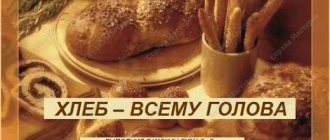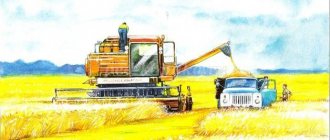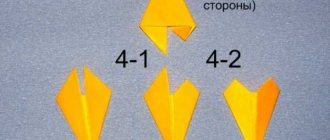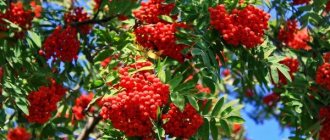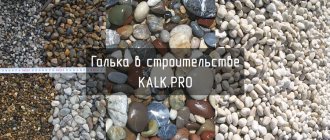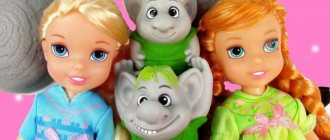Class hour in 4th grade on the topic: Bread is the main source of life
Scenario for a class hour in 4th grade “Bread is the head of life.”
Description of work : This note is intended for classroom teaching in elementary school. Preparatory work is underway: the children are learning poems and drawing pictures. You can invite 4th grade students to visit. Scenario for a class hour in 4th grade “Bread is the head of life.”
Goal: developing a respectful attitude towards bread and the people who take part in its creation. Objectives: -introduce the professions that are necessary for growing and creating bread; - show, using photographs of besieged Leningrad as an example, what the price of bread was during the Great Patriotic War; - cultivate a caring attitude towards bread. Equipment: - exhibition of student drawings - song “Bread is the head of everything” - Beethoven “Moonlight Sonata” - presentation - multimedia projector Lesson progress Teacher: Today we have a holiday dedicated to bread. Bread was and is considered the most valuable wealth on earth. People fly into space, plow the seas, rivers, oceans, build houses, teach children, but bread remains bread. Slide
Glory to peace on Earth! Glory! Glory! Glory to the bread on the table! Glory! Glory! Glory to those who grew bread, Spared no labor and effort! Glory! Glory!
Teacher: Nowadays, not only children, but also we, adults, are so accustomed to the fact that there is a lot of bread and buns on the table and in stores. But do we know how to treat it with care? Today we will talk about bread and caring for it. Student: Here it is - fragrant bread. Here he is - warm, golden To every house, to every table - He came - he came. It contains our health, strength, It contains wonderful warmth. How many hands raised him, protected him, took care of him. Glory to the bread on the table! Glory to peace on Earth! Glory to those who grew bread and spared no labor and effort! Slide
Teacher: Bread is the head of all life! From time immemorial, guests have been greeted with bread and salt on Russian soil; The parents of the newlyweds greet the newlyweds with bread and salt. Student: In Russia they baked bread with domes, so that there was enough, like the sky, for everyone. At the wide tables in the house, it was considered a sin to abandon Baby! Slide
Teacher: Bread that is similar to the one we eat appeared 5 thousand years ago in Ancient Egypt.
In Rus', bread was called zhito in the old days, from the word live, bread-breadwinner. Slide
Teacher: Over the course of 60 years, a person eats 15 tons of bread, approximately a whole carriage. To bake one loaf you need approximately 10,000 grains. People from 120 professions work to bring bread to our tables. Students: I’m not afraid to repeat myself in my poems, Bread knows no bounds of praise, If rye is earing in Russia, It means that someone is seriously lacking sleep. After all, the grains did not immediately become the bread that is on the table - People worked long and hard on the earth! Slide
Teacher : You guys live in the city. You haven’t seen how early people who live in villages leave for work, how late they return from the field, tired, all covered in dust, in dirty shirts soaked in sweat. The work of a grain farmer is hard, but it is one of the most important professions in the world, because these people grow bread. Bread travels a long way to get to our table. We must first cultivate the land, sow grain, and care for the crops. Pupils: Take off your hat in front of this arable land, son. Do you see a stalk of bread coming through? How much work has been put into this grain, Only the sun, the wind and the water know... The breeze asked, flying by: - Why are you, rye, golden? And in response, the spikelets rustle: “Golden hands grow.” Teacher: Day and night, in heat and rain, there is a battle for the harvest. This battle is bloodless, but soaked in the salty sweat of the grain growers. For them, bread is not only the final product, but also personal pride, joy and pain. Students: Lush, soft, baked, lightly browned, Bread with a gilded crust Coming to you from afar. As soon as the snow melted in April, the fields turned green. We say: "Bread". The golden expanse is endless, Harvesters are working there, We say: “Bread.” Here the grain flows like a river, To become flour. We say: "Bread". The dough swirls in the kneader and is baked in the fire. We say: "Bread". The earth's native juices are in it, the cheerful light of the sun is in it. Grab both cheeks and grow up to be a hero! In the morning the smell of bread pours out. Loaves are running along the trays. I know how that bread is given to the working righteous hands. It is molded at dawn, so that it becomes ruddy in spirit. There is no easy bread in the world, In all centuries bread has been difficult. It is difficult in summer and winter, now sowing, now reaping, now grinding. That bread, at a special price, is placed on the plowman’s table. He, as before, so now, has always had the same price. It is not the one in the store, but the one in the field, the price. He who plowed the land himself will cut the bread at the table without dropping a crumb, tying the well-trodden stitches on the fresh tablecloth in a knot during the days of suffering. Teacher: The Russian people have composed many proverbs and sayings about bread. Which one of you can name them? Students name proverbs and explain their meaning Slide
1. Bread is the head of life 2. Lunch is bad if there is no bread.
3. Bread in the bins means happiness in homes. 4. The hut is not red in its corners, it is red in its pies. 5. Get angry, scold, go for bread and salt. 6. Not the bread that is in the fields, but the one that is in the bins 7. Without a piece of bread, there is melancholy everywhere. 8. Sweat on your back – bread on the table. 9. They danced that they were left without bread. 10. To get up early is to get a lot of bread, and to sleep long is to get enough sleep. Teacher: Bread is the most valuable product. We eat it every day. For a long time people could not give an answer why bread does not get boring. It turns out that bread contains a lot of nutrients - carbohydrates, fats, proteins, mineral salts, vitamins. This means that a person receives almost half of the energy resources necessary for life from bread. Students: Hearing good news. Seeing the strength of the country, we must bow down to bread. You can live without many products - You can’t live without bread forever. The head and foundation of everything, In him is the work of grain growers, their sweat, And the people often call him bread - an affectionate word. What's a feast without bread? Since time immemorial It is not for nothing that in Rus' they greet welcome guests with bread and salt. Teacher : Do you and I always treat bread with care, listen to the poem. Student: I remember that minute from my mischievous childhood. Suddenly my mouth became boring from the rye bread. And I threw a piece on the ground from my grandfather on the sly. And I stepped on the piece with my bare, grimy heel and trampled it. And all as I was I buried my nose in the dust. And my grandfather didn’t beat me before. And they didn’t beat me at all. Teacher: What do you think? Why did the grandfather hit his grandson, although he had never hit him before? Christina will recite another poem. I saw it once, on the road. The boy was throwing dry bread. And the crazy feet deftly beat the bread. He played like a ball, a mischievous boy. Then an old woman came up and, bending down, took the loaf, suddenly began to cry and left. The boy looked after her, smiling. I decided that it was a beggar woman. Teacher: Why did the old lady cry? These are people who experienced hunger and went through difficult war years. For them, at that difficult time, a piece of bread was the line between life and death. They know the price of bread firsthand, they know how to value and take care of it. Student: The boy was ten years old, He walked along the alley And carried home bread in a wicker, Chewing an expensive roll. On the way, loaded with sand, He met a five-ton truck, And he threw a half-eaten piece after her... But if that boy had thought About the grain, about the miracle, And how many thoughts and worries people put into it, About the fact that the bread did not come suddenly From the hoards of yellow-haired trees, And through hundreds of strong hands And wise mechanisms... But if a boy were to collect the ears of corn between the stacks, So that piece would not lie, trampled underfoot... Teacher: Guys, what can you say about the action of this boy? In Russia there has always been a special, respectful attitude towards bread. It was considered a great crime to throw even a small piece of it. Do not throw the bread, handle it with care! Remember: if each of us throws out half a slice of bread a day, then in a year we will gain 7 kg, or 15 loaves. If we multiply them by the number of people living in our country, it turns out that together we will throw away the bread that was grown by over 350 collective and state farms. If the loaf, the loaf of bread became stale, they were thrown away, it means that the grain grower, the flour miller worked in vain, they stood in vain Have a hot leche baker. Teacher: This year marks 70 years since the siege of Leningrad was lifted. Slide
Pupils: Bread has always been held in high esteem in Russia - Its open spaces are the main wealth. Do you want to know its price? – Ask, Leningraders can answer you. They will remember a city without lights, When the enemies stood on the threshold, And nine hundred long days of blockade... Shells whistling... Air raids... A prickly snowstorm, chalk... Following it, hunger followed into the houses... And there was no bread, no warmth - There was only firm faith in victory! Slide Sounds of bombing. Teacher: During the siege of Leningrad, we had to reduce the standards for the distribution of bread to city residents. The workers received 250 g per day, and the rest of the inhabitants - 125 g. This bread contained very little flour; wood cellulose, cake, bran, rice husks, and wallpaper dust were added to it. The bread tasted sour, bitter, and grassy. And yet he helped the Leningraders survive. Leningraders received help from the mainland along the legendary ice road laid across Lake Ladoga. The people rightfully called it the Road of Life. Look what a piece of bread this is, which people call ration. Student: 125 blockade grams With fire and blood in half. Oh, we learned in December: It’s not for nothing that Ordinary bread is called a “sacred gift”, and it’s a grave sin to even throw a crumb on the ground. Slide
Student: With chaff, with dust, with cake, He still seemed most desirable of all, and the mothers sighed heavily and secretly when they divided him into particles. I remember bread, military, bitter. It's almost all quinoa. In every crust, in every crumb there was a bitter taste of human misfortune. And grief was a frequent visitor. Their childhood days were full. I especially remembered that happiness was equal to the bitter bread of war. Slide
Teacher: But even such bread was not enough during the terrible winter of 1942. There were notices all over the city. They exchanged everything that was valuable in the house, but only for one thing - food. People stood in long lines for bread. Here are photographs of those terrible years. At the beginning of December, people began to swell and turn black from hunger and cold, fall in the streets, and freeze in their beds. There was not enough strength to dig graves; there was no one to make coffins. The only thought that worried everyone was where to get bread. Slide
Dramatization of the poem. (Mother, dressed in an old coat, tied with a torn scarf, rocks the child, bending over to him, sings a lullaby, persuades) Narrator: War, and cold, and blockade... What terrible years! I will never forget the hungry children of Leningrad. Son: Give me at least a piece of bread, mom,” a child’s voice is barely audible. Narrator: And mom whispers: Mom: Sleep, son, The bunny will bring bread in the morning. Son: Give me, mommy, at least a piece... Narrator: He said and closed his eyes. She pressed him close to her - my son was sleeping. And a tear slid down his cheek. He will not ask for more bread... The mother was numb with grief. (A girl in an angel costume slowly approaches and covers the mother and child with her “wings”)
An angel descended from heaven to take the mother and child to her.
Teacher: Many feats were accomplished by car drivers who delivered food to Leningrad along the “Road of Life.” Student: It seemed like the end of the earth. But through the cooled planet the cars went to Leningrad: He is still alive, he is nearby somewhere. To Leningrad! To Leningrad! There is enough bread left for two days, There mothers stand in crowds at the bakeries under the dark sky. And it happened like this: while driving, the rear car sank. The driver jumped up, the driver is on the ice, Well, that’s right, the engine is stuck. A five-minute repair is a trifle, This breakdown is not a threat, But there’s no way to open your hands: They were frozen on the steering wheel. If you straighten it out a little, it will bring it together again. Stand? What about bread? Should I wait for others? And bread - two tons? He will save sixteen thousand Leningraders. And so he wet his hands in gasoline, set them on fire from the engine, and the repairs quickly began in the flaming hands of the driver. Forward! How the blisters ache, The palms are frozen to the mittens. But he will deliver the bread and bring it to the bakery before dawn. Sixteen thousand mothers will receive rations at dawn - 125 blockade grams With fire and blood in half, Oh, we learned in December: It’s not for nothing that Ordinary bread is called a “sacred gift”, and it’s a grave sin to even throw a crumb on the ground. Teacher: 641,803 Leningraders died from hunger during the blockade. There are thousands of graves at Piskarevskoye Cemetery. There are always a lot of people around one. They stand silently and cry. On the grave among the flowers lies a slice of black bread. And next to it is a note: “Daughter, if only I could give it to you then...” I think that you have gained respect for bread and the people who grow and bake it, and you will treat it with care both at home and in the dining room. Disciple: In the years of hardships and hardships, the New World grew mature and strong, The people walked into the fires of battles For freedom and for bread. So the words are correct: Bread is the head of all life. Teacher: Before you throw away a piece of bread, remember that 925 million people on the planet are starving these days! Teacher: In the city of Zelenogorsk, Leningrad region, there is a monument to Bread. On a granite pedestal 80 cm high, there are bronze bakery products. The basis of the composition is black bread, 125 daily grams of which saved the lives of thousands of hungry blockade survivors. Slide
Pupils: Please! Don’t drop it, son, when you eat a flatbread, even a crumb of bread! We collected every spikelet, When the sky thundered with the threat of war. That bread saved Moscow and Leningrad, Even a crumb of bread prolonged life. But even now, every cake has been paid for a hundredfold with hard work. More than once I have forgiven you for your mischief, I know that childhood without play is absurd, But I cannot forgive just one thing - Even a crumb of wasted bread. The grains of our days, shine with carved gilding, We say: take care, take care of your native bread. We don’t dream of a miracle, Send us a living speech: “Take care of your bread, you people, Learn to take care of your bread!” Teacher: Each of us must remember: always having bread on the table is great happiness. “Bread is life. He is eternal, like a mother, like the Motherland.” Student: Bread smells of sun and earth, and tears, and wind, and thunderstorms. How much care and work there is in him, How much good he brings to people! Teacher: Popular wisdom says: “No matter how much you think, you can’t think of better bread.” And indeed it is. Any food, any food gets boring after long, frequent consumption, but bread never gets boring. Bread is always good, and it is very important to be kind and attentive to bread. This is needed not so much by bread, but by us, each of us, because next to bread, every person becomes better. “No lump of gold can replace a crumb of bread.” Students: To those who bake bread at first light, send millet for porridge, to those who plow the earth deeply with a sharp plow, we say thank you - we thank them for everything. Everything is related to bread - Russian bread is involved in everything: To the friendship of nations, to the companions of the movement, To peace, truth, to your happiness. We don’t dream of a miracle, Send a living speech to us: “Take care of your bread, people, Learn to take care of your bread!” “Bread is the head of everything.” Words live forever. Foliage and grass wither. Bread is the head of everything. In the storms of epochs, names Quietly lives, the truth of all times: Bread is the head of everything. In the far edge of the village, in the heart of the country - Moscow. Everywhere there is light for us: Bread is the head of everything! Slide The song “Bread is the Head of Everything” plays. A student comes out with a loaf of bread on a white towel. Student: According to the old Russian tradition, dear guests, taste our bread. The student treats those present with bread and salt.
We recommend watching:
Class lesson summary on the topic: My family is my wealth, 4th grade Conversation with elementary school students on the topic: Signs Class hour 3rd - 4th grade. My friend - book Thematic class hour on ecology, grades 3-4
Similar articles:
Class hour 4th grade. Russia is my homeland
Class hour 4th grade. Communication culture
Class hour. Tolerance 4th grade
Cool hours in 4th grade
Class hour 4th grade. Teach yourself to study
